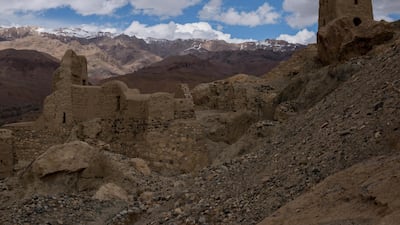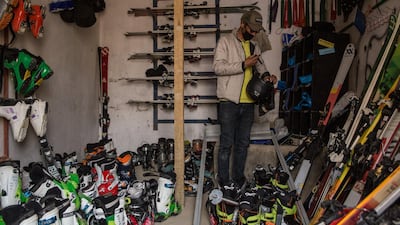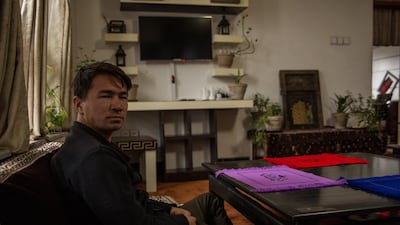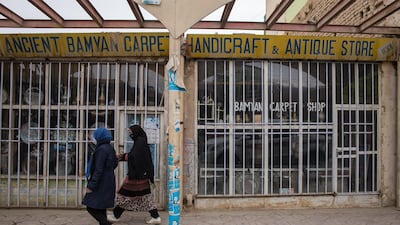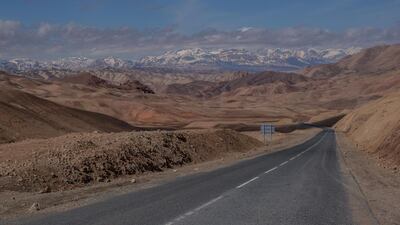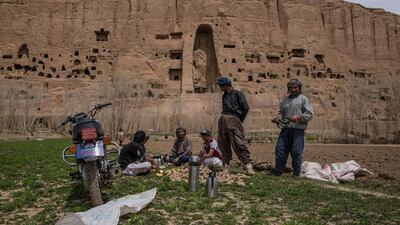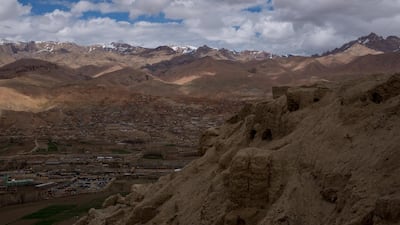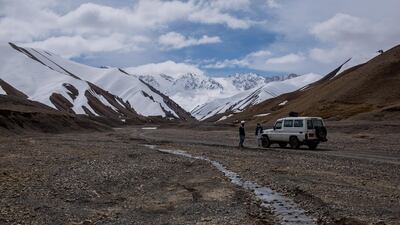Bamyan was on track to break its tourist record this year.
The central Afghan province of rugged mountains, clear lakes, historical sites and untouched nature offers a different perspective on a country known for poverty and war.
In Bamyan, there are no Taliban fighters or landmines any more.
Last year, as domestic flights from Kabul resumed, about 400,000 tourists – including 500 from abroad – flocked to the peaceful holiday destination. An even larger number was expected this year. But then came the coronavirus pandemic.

“Zero. That’s how many people will come this season. These realities are hard. Thousands of residents depend on tourism here and there’s little alternative,” said Abdullah Mahmoodi, owner of Highland Hotel, a quaint and cosy guesthouse catering mainly to international travellers.
The hotel, in a newly built part of Bamyan city, can accommodate 11 guests in its five rooms, which cost between $40 and $60 (up to Dh220) per night. But as the first cases of Covid-19 were reported in the province a month ago and worldwide travel restrictions kicked in, two tour operators cancelled dozens of bookings for foreign visitors at Mr Mahmoodi’s guesthouse.
Afghanistan’s confirmed coronavirus cases have passed 1,500, with only a handful in Bamyan. But with limited testing capacity in the country, the actual number of infections is suspected to be much higher.
With the capital put on lockdown, commercial flights to Bamyan were cancelled this month and roads in and out of the province closed; the last flight from Kabul – a 25-minute journey – brought only five passengers. None of them were tourists.
Mr Mahmoodi employs 12 staff at the hotel and runs a restaurant in the town centre. “I’m continuing to pay my staff half of their salaries, but this is hard," he said. "Besides that, we have contracts with butchers and grocers and also co-ordinate with locals in remote villages to organise accommodation during treks. Everyone depends on the tourists, but this year they won’t come.”
Poverty increased in Afghanistan as jobs disappeared and food prices soared since the Covid-19 outbreak began. Beggars line the streets of urban centres and day labourers struggle to find work. The virus arrived amid a dispute between President Ashraf Ghani and his political rival, Abdullah Abdullah, over the September presidential election, halting progress towards direct peace talks between the Afghan government and the Taliban.
“The tourism income will be hard to recover. The sector has been developing and booming and has brought opportunities and financial stability to about 25,000 people,” said Muhammad Tahir Zaheer, governor of Bamyan.
Tourism had become the province’s second biggest industry after agriculture, he said.
Bamyan has come a long way since 2001, when the Taliban blew up its famous Buddha statues, a Unesco world heritage site that is under restoration.
In 2009, Afghanistan’s first national park, Band-e-Amir, was established in the province – about 600 square kilometres of clear blue lakes and deep canyons nestled in the Hindu Kush mountains at an altitude of about 3,000 metres. Most recently, the province’s mountainous terrain has become a hub for trekking, camping and adventure and winter sports, including mountain biking and ice-climbing.
“In Band-e-Amir, we have taught tourism principles to 14 villages and we also constructed picnic areas and campsites. Tourism was up and coming and a lot of people started to rely on it,” said Ebrahim Abrar, field project manager with the Wildlife Conservation Society.
“Tourism is an important alternative livelihood. It essentially means people are using less natural resources and are cutting fewer trees. If this continues, the tourism industry can even save biodiversity."
Bamyan draws outdoors lovers, historians and families alike, with the province’s safety and laid-back atmosphere appealing to many. Most of the locals are Hazara people, an ethnic minority in Afghanistan that continues to face widespread discrimination.
On a hill above Bamyan town’s centre, with a panoramic view of what is left of the Buddha statues, Ali Shah Farhang, 29, sits in his office in a mud-walled compound with rooms full of skiing and camping equipment.
Mr Farhang has run the province’s ski club since 2011. This year, he helped to stage the 10th annual ski challenge, drawing thousands of visitors and dozens of participants, and was preparing for the summer’s hiking and trekking season.
About 80 per cent of Bamyan’s mountains are accessible for skiing and other sports, he said, before going quiet.
“We’re done for,” he said. “There won’t be any business this year and thousands of people will suffer.”
_____________
Coronavirus in the Middle East
_____________
Mr Farhang admitted to mostly staying at home these days, wondering how he would support his wife and son, 2, through such difficult times.
“We had big plans to set up ecotourism programmes but we have to rethink our strategy now,” he said, sorting through skiing equipment stacked up in one of the rooms.
"People are afraid to travel and due to the coronavirus, everyone should stay at home," Mr Zaheer told The National. "Hotels and historic sites have already closed and there's currently no date when these will open again."
There were different plans for the province. Negotiations with international airlines could have led to a direct connection from Dubai, easing travel for international tourists hoping to avoid transiting through Kabul.
Although Bamyan is safe, the three-hour drive from the capital is not. “The Taliban continues to bother people on the way,” Mr Zaheer said.
Before the coronavirus outbreak, flights to Bamyan on Kam Air, the only airline servicing the province, were usually fully booked. It is not yet certain when the service will resume.
“After a long winter, everyone was getting ready to welcome visitors – from hotels in the city to rural villagers helping to organise cultural tours,” said Mr Mahmoodi.
“Instead of the people, the coronavirus came – and if it doesn’t kill us, it certainly will kill many people’s businesses.”
